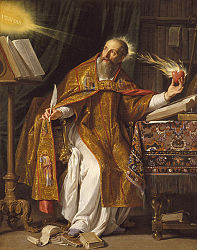115 - Me, Myself and I: Augustine on Mind and Memory
Augustine explores the nature of the human mind in order to establish its similarity to, and dissimilarity from, the divine Trinity.
Themes:
• Augustine, On the Trinity, trans. E. Hill (Brooklyn: 1991).
• Augustine, On the Trinity, trans. S. MacKenna, ed. G.B. Matthews (Cambridge: 2002) [translation of books 8-15 only]
• B. Bubacz, St Augustine’s Theory of Knowledge (New York: 1981).
• P. Cary, Augustine’s Invention of the Inner Self (Oxford: 2000).
• P.E. Hochschild, Memory in Augustine’s Theological Anthropology (Oxford: 2012).
• J. Mourant, Saint Augustine on Memory (Villanova: 1980).
• G. O’Daly, Augustine’s Philosophy of Mind (Berkeley: 1987).
• R.J. Teske, “Platonic Reminiscence and Memory of the Present in St Augustine,” New Scholasticism 58 (1984), 220-35.







Comments
Augustine on Memory
Dear Peter,
Most excellent show today on Augustine and memory. I was taken esp. with statements you made toward the end about Augustine’s sense of a permanent self-awareness or self-consciousness even despite our fleeting phenomenal self-awareness and other memories.
Your comments here intersect with my interest in the similar (minus the explicit appeal to theology) Kantian analysis of self-consciousness: Kant’s notion of transcendental (noumenal) subjectivity vs. empirical (phenomenal) subjectivity.
I suppose this should not be too surprising, given that Augustine looks forward to Descartes and Descartes is the stepping-stone to Kant.
I am intrigued how all this can appeal to notions of the unconscious as well as traditions of apophatic theology, usually Neoplatonic & Christian (though Kant’s discussion of the un-knowability of the transcendental self gets me all Buddhist—that there’s no soul to grasp, that ultimate emptiness, yet, for Buddhists, maybe less so for Kant, this is ultimately nirvana . . .).
Anyway. You mentioned in the episode all three of Augustine’s great texts (curious that it is three?): The City of God, The Confessions and On the Trinity in discussing the subject.
Would you be able, if not inconvenient, to highlight the sections of these texts most germane with this subject of memory and self awareness? (I know about The Confessions’ Book X. I should be better versed on Augustine here than I am.)
From the secondary sources you list, while they all look very good, info-wise, do any in particular seem relevant with this direction: the Augustinian—Cartesian—Kantian history of self-awareness and (potential) religious thinking?
A nice episode to lodge in that “large and boundless chamber.”
Rhys
OKC, OK.
In reply to Augustine on Memory by Rhys W. Roark
Phillip Cary on Augustine
You may want to read a short essay by Phillip Cary published in Zygon in 2011 (Vol 46,no. 1) entitled "Philosophical and Religious Origins of the Private Inner Self". He doesn't mention Kant but Descartes and Locke are in there.
I stumbled across it in a Google search and reading it was enough to make me want to take a look at his book (which Peter lists).
In reply to Phillip Cary on Augustine by Pete Bataleck
Augustine on Memory
Dear Phillip,
Thanks for the reference. This sound just like what I am looking for.
If you happen on anything else, let me know.
Best,
Rhys (pronounced "rise")
In reply to Augustine on Memory by Rhys W. Roark
Memory
Hi Phillip and Rhys,
Thanks for this discussion -- the best texts on memory in Augustine are as you say Confessions 10, and then On the Trinity, especially I guess books 10-11. The Hochschild book in the bibliography is a very complete survey of texts on memory across Augustine's corpus. For comparisons to modern philosophy I would also check out Stephen Menn's book "Augustine and Descartes."
Cheerio,
Peter
Augustine on Mind and Memory
Dear Peter,
Congratulations on a great series. I came to it late and have spent the last month catching up all the way from 1 to 115. Today I finally reached the end of the back catalogue.
I came through the latest Augustine episode with a question stuck in my head (a dumb Physicist's question - that being my original training): what criteria are being used to define a material and a substance? Presumably, there's some overlap: all materials are substances, but not all substances are material? However, when you take all 'material' characteristics out of a thing, what identifiable characteristics are left?
To take a case in point: if the soul is an immaterial substance, what properties does it have that make it a substance but not a material? If I could think of something else that I thought might be an immaterial substance, how could I test it?
If you've covered the distinction in any of the episodes,I apologise, it must have passed me by.
Best Regards, Dave Martin
In reply to Augustine on Mind and Memory by Dave M
Eternal and Unchanging
And I have another physicist's question, which has been bugging me since at least Socrates and Plato: what is the basis for the conflation of 'eternal' and 'unchanging'? I can easily imagine an eternal thing (/substance/process/whatever) that changes unceasingly. The concept of perfection gets wound up in there, too. But I can also imagine an eternal being which displays different aspects of perfection by varying between them.
There seems to be some considerable weight put on the link between 'eternal' and 'unchanging' by various schools, including Augustine. Did anyone provide an argument in support of this?
Ta,
Marissa
In reply to Eternal and Unchanging by Marissa
For the physicists
Thanks for the questions folks. To handle them in order:
1. The criteria for substancehood should be neutral with respect to materiality and immateriality - because there are substances of both types (just as the criteria for animal-hood should not say whether the thing in question is rational or irrational, since there are both kinds of animals). The classic formulation in Aristotle, which many would accept, is that something is a substance if its being does not depend on the being of something else (the way an accidental feature depends on the substance). Of course that causes problems if you think that God is responsible for maintaining things in being! But if we overlook that point, this independence is a feature that would be displayed by both material and immaterial substances. Anyway, whatever you say a "substance" is, an immaterial substance is then going to be defined negatively, most of the time -- e.g. as not having parts or spatial extension.
2. To Marissa: yes, that's a good point. Actually Proclus, among others, distinguishes explicitly between two kinds of "eternity" and uses different Greek words for them: there is eternity in the sense of endless in time, and eternity in the sense of unchanging and transcending time. It's really only Plotinus, I think, who first gets to the idea of eternity as meaning unchangingness or timelessness -- though even in Plotinus we find remarks to the effect that eternity is some kind of "duration" or "life" but one that doesn't involve change. In fact there might be room for three kinds of eternity:
(a) Subject to change, but having existed infinitely in past and future.
(b) Not subject to change but having "duration" which would be some kind of permanent, unchanging existence.
(c) Transcendence even of duration, so not occupying anything we would recognize as time.
I think that in late antiquity and the medieval era we often see them failing to distinguish clearly between (b) and (c).
Hope all that helps!
Peter
In reply to For the physicists by Peter Adamson
More physicists' questions
Hi Peter,
Thanks for taking the time to answer. That certainly helped me to get my head around the issue. So just to clarify, if I take Aristotle’s definition of substancehood and combine it with a reasonable definition of materiality, I’d get something like: an immaterial substance is something whose being does not depend on the being of something else, but has no parts or spatial extension.
One other thought on this: if I regard spatial extension as having ‘being’ (it seems to meet the definition) then it’s not clear to me that anything ‘material’ can ever be a ‘substance’, since the ‘being’ of material things appears to depend on the existence of spatial extension.
On the possible types of eternity, one of the things that bugs me is the idea that God is not subject to time. If God’s eternity is of either of the kinds (b) and (c) which you outline, it’s not clear that ‘action’ would have any meaning to God, since action requires extension in time (if the beginning and end of an action are indistinguishable, then there is no action). It also seems to me that morality, at least as we understand it, can only be defined if action exists. So perhaps the answer to that difficult question about why do bad things happen in a universe created by an eternal God is simply that the ‘bad things’ simply have no meaning to an eternal being.
In reply to More physicists' questions by Dave Martin
Substances and eternity
Good, glad that was helpful. I should by the way have said that there are other ways one could define substance, even in Aristotle. For instance another candidate would be "that of which other things are predicated, but which is not predicated of anything else." Another is, "that of which contraries are predicated" (e.g. man goes from being white to being non-white). This sort of criterion could help you avoid the dependence issues (on God, spatial extension) we were discussing.
Another thought on your interesting spatial extension point: we should distinguish the claim that A cannot exist without B from the claim that the being of A is dependent on the being of B. In the first case we have a mere necessary condition and it could be the case that A is ontologically/conceptually prior to B, even though it can't exist without B's existing. For instance no opaque body can exist without being colored; but intuitively we would say that its being doesn't depend on it being colored. I suspect spatial extension is like that: a necessary condition for material objects to exist but not something on which the being of such objects depends.
Regarding the point about God and eternity: yes, absolutely. There are at least two problems here, the one you mention (how can a timeless God perform acts whose results occur at one time rather than another, like creation or a miracle?), and also the problem of how a timeless God could know things that are happening in time? Sorabji has an interesting discussion of this in "Time, Creation and Eternity" where he asks whether God could know, e.g. that I am typing _right now_. I think that Judeo-Christian philosophers are running into a problem here, because they adopt a Neoplatonic idea of God as unchanging/timeless, but they don't want the Neoplatonic idea that God's relation to His effects is permanent and unchanging. This will yield centuries' worth of difficulty as we'll be seeing soon in the podcast!
Peter
In reply to Substances and eternity by Peter Adamson
Substances and Eternity
Thanks Peter,
I look forward to the philosopher's battling with the eternity question in the forthcoming podcasts.
From a Physicist's point of view, it's interesting to note that my forerunners spent a chunk of the nineteenth century grappling with the problem of spatial extension. We wanted to fill free space with ether to explain how there was 'something' there to carry travelling waves, in an argument not dissimilar to the argument raging between early philosophers about unoccupied space having 'being'. We thought we had it resolved with the Michelson–Morley experiment, which seemed to prove empty space wasn't filled with anything ( of course, whether this means it does or doesn't have 'being' is a slightly different question), but some of the latest problems with a Big Bang Theory that doesn't seem to work quite right have - I would say - sent the jury out for another go at the verdict.
Looking forward to the next podcast!
Dave M
In reply to For the physicists by Peter Adamson
Substancehood
I have another 'substance' question. It seems that you, and Charles Brittain even more so, have been speaking about the three substances - which are also one substance - of the human mind, as:
* the memory
* the act of remembering/thinking
* the desire to remember/think
I can accept that a memory is a 'substance', but can an *act* also be a 'substance'? e.g. if a rock is a substance (I don't even need the inverted commas for a rock!), then is the-rolling-down-a-hill which a rock might engage in, also a 'substance'? It seems odd. Similarly, the rock's *desire* to go downwards doesn't seem very substantial, either.
I can predicate things about the-rolling-down-a-hill - quickly or slowly, for example - but that doesn't seem to me to help.
In reply to Substancehood by Marissa
Eternal and Unchangeable--The Link
Hi Marissa and Dave,
I did not discover these wonderful podcasts until earlier this year, so I'm coming in late. I'm not sure if you are still being notified of new comments or even interested in pursuing some of these issues. I've often found physicists (as you describe yourselves) to be engaged with some of the most intriguing and perennially puzzling ideas. So I have a number of questions to discuss with both of you on the topics of substance, materiality, processes, time and eternity. But I'll limit this to just one issue until I hear from you.
Marissa asked if there had been an argument to support a link between 'eternal' and 'unchanging'. I don't know if there has been, but I'll have a go at it based on the nature of change. I'm going to lean heavily on Aristotle here because I think he was the first in the Western tradition to engage in a lengthy and fruitful inquiry into change. He did so because change is the fundamental feature of all natural beings and processes or events.
To more or less paraphrase: Change is always from a 'this' to a 'that'. This fetus becomes a dog. These materials become a teapot. This food waste becomes compost. The most fundamental change is substantial change or, in other words, the coming-to-be (exist) or ceasing-to-be of a fundamental being (Aristotle's ousia).
Thus, if some item under consideration is a substance that, as such, is unchangeable (not capable of substantial change), then it neither comes-to-be nor ceases-to-be. And that being so, it is eternal.
Of course, this argument does not establish that there is any such being; it just explains the link between unchangeable and eternal, which is what you requested. Further, this argument only establishes that such a being is eternal in sense (a) that Dr. Adamson (aka Peter) outlined above. That is, eternal in the sense of everlasting---existing at all times. The argument does not rule out Marissa's examples of “an eternal thing that changes unceasingly” (at all times?) or “displays differents aspects of perfection by varying between them.”
For that, one could use an argument that shows that a being that is eternal is Peter's sense (c) is possible, and thus show the connection between unchangeable and eternal in this stronger sense of eternal. [To be quite clear, we are not talking here of (a) existing at every time—everlasting, but (c) existing at no time, “beyond” time, timeless.] I believe there is such a valid argument (and I'll throw in that the premises are true just to make the argument sound). I would go out even further on the limb and hope to show that, in my humble opinion, contemporary physics is committed to eternal beings. But I'll wait to see if either of you or some other inquirer is interested.
Otter Bob
The point about not having to
The point about not having to pretend suffering in this life isn't significant if you believe in the afterlife is very compelling indeed. Point one to Christianity as something that doesn't cop out on facing all aspects of reality, rather than a warm-fuzzy "fairy tale" that some atheists dismiss it as (and, of course, some Christians embrace it as).
Early Christian Philosophy
Dear Mr. Adamson, I'd like to thank you for this podcast. I am presently studying philosophy at the FAU in Erlangen and am wondering whether you could suggest an introductory book on the early Christian philosophers. Thank you. Kind regards, Falk Wisinger
In reply to Early Christian Philosophy by Falk Wisinger
Early Christian philosophy
I would definitely suggest G. Karamanolis's book on this: The Philosophy of Early Christianity.
Add new comment